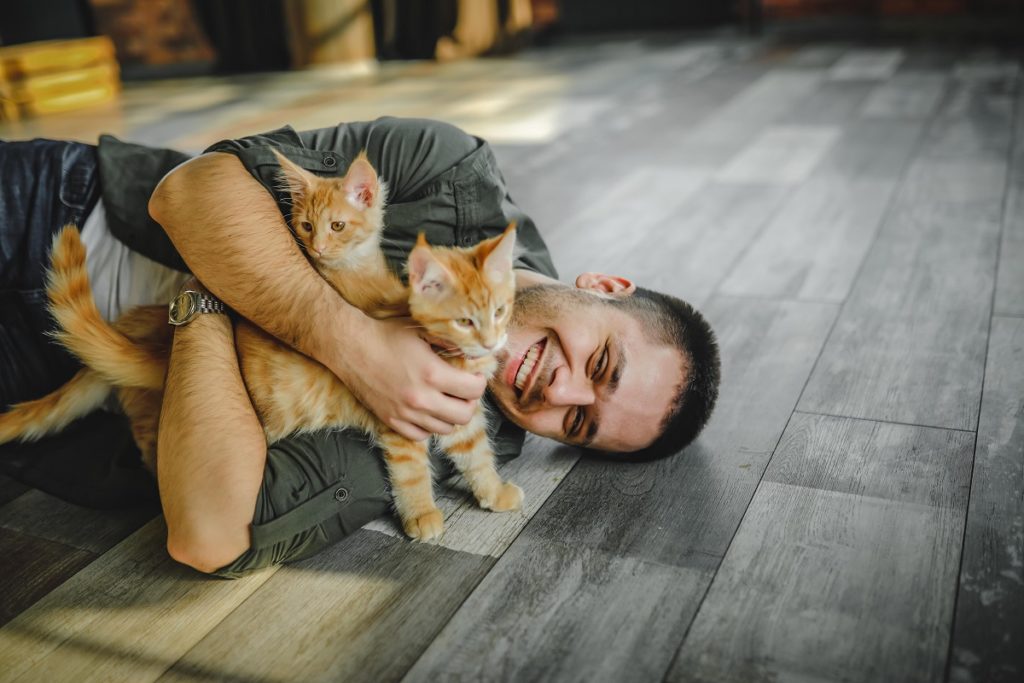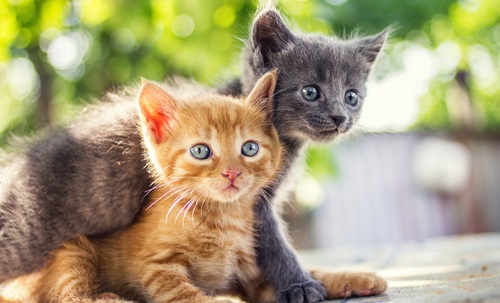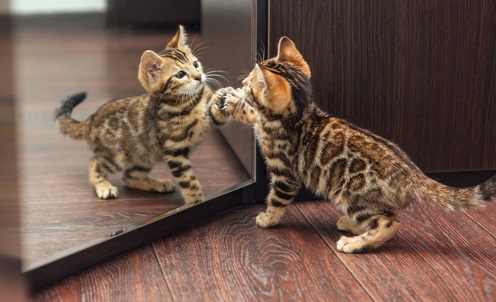Lately, your fuzzy feline is showing some extra-frisky behavior – and you’re not sure exactly why. You’ve given him plenty of scritches behind the ears, snuggles, treats, and lots of attention – so why is your kitty acting so hyper?
Pet owners are always concerned with their pet’s behavior and may ask many questions like why is my dog being lazy or why is my cat sneezing. But not to worry, questions for new owners can always be answered. For new pet owners – particularly first-time kitten parents – trying to understand a little kitten’s crazy behavior can be a bit befuddling, but not to worry. In fact, most experts will agree that hyperactivity in kittens is not only considered normal behavior, but hardwired in their DNA.
Learning how to entertain a cat can be beneficial during hyper times. However, similar to small children, young cats are prone to bursts of energy; and it’s important for their humans to provide them with adequate playtime, discipline, and of course, lots of patience. Let’s explore some of the reasons why kittens get so hyper, as well as tips for how to calm them down.
Understanding Hyperactive Kittens: Normal or Crazy Behavior?
Once an adopted kitten settles into his new home, it’s perfectly natural to explore his new environment. At first, he might be shy or stand-offish, especially if he was living in an animal shelter. But after a few days, kittens will typically acclimate to their surroundings (and humans), which may include some bouts of hyperactivity.
Research has shown that high-energy behavior in young cats is standard fare – as a matter of fact, it’s actually a sign that the kitten is learning life skills. Much like their wild ancestors, domestic cats are instinctually driven to learn certain survival skills – such as climbing, running, and even attacking – at a very early age. And while it may seem crazy (especially for folks who have never raised a kitten before), it’s completely normal for them to show signs of aggression.
To further understand a kitten’s hyperactive behavior, here are several reasons why he may be showing signs of boundless energy (and, in some instances, how to help guide him along the way):
Feline Instinct: Because cats are natural predators, even domestic kittens are instinctively set up to act out ‘hunting’ behaviors similar to their cousins in the wild – stalking, pouncing, and maybe even attacking a rogue toe sticking out of a blanket – are all just part of the process. However, kitties don’t automatically know what they’re doing, so they must develop those ingrained skill sets in their own environment. Even if a parent decides that the cat will live strictly indoors, it’s still important to the kitten’s overall development to hone these instinctive (although seemingly hyperactive) urges.
Helpful Tips: Some experts suggest engaging the kitty with feline-friendly toys that look like prey – e.g., fuzzy mice plushies, a plastic fish on a pole, etc. – to help develop his hunting and predatory skills. Other beneficial interactive toys, such as puzzles and tunnels, can help young cats in their cognitive development and keep their minds sharp.
Social Skill Development: Domestic cats require lots of patience, time and guidance from their humans in order to develop acceptable social skills. Although a kitten’s mom and its littermates are the first to help in this natural process, a young cat will require additional discipline from his pet parents. In the instance he was taken away from his mother too soon, he may need some extra TLC while learning the ropes. Teaching a kitten appropriate social skills at an early age is essential, since they are most impressionable within the first eight weeks. Acclimating him to different scenarios will expose him to stimuli – such as people, places and things – that can potentially enrich his social development. For example, socializing kittens when they’re very young will help them to learn not to scratch or bite other animals or people, or in other cases, help avoid hyperactivity or aggression around strangers/in new situations, etc.
Helpful Tips: Developing a kitten’s social skills can be taught during one-on-one playtime, which also becomes a valuable bonding moment for both cats and their humans. For pet parents who are having difficulties with overly aggressive behavior, consult with a trusted vet for professional training tips. There are also many videos available on how to socialize kittens that may be useful to first-time kitten owners.
Anxiety & Fear: While the phrase ‘scaredy-cat’ may have been a phrase used on the playground, it’s actually a very real thing when it comes to young kittens. In fact, it’s all part of the kitty’s learning curve: he may have experienced something new and in turn, won’t stop running around the house like a maniac. Experts suggest mindful awareness – in other words, try to correlate these seemingly out-of-the-blue episodes. If it’s the kitten’s first time seeing a baby, hearing a strange noise in the apartment, or meeting the neighbor’s giant Labrador, he may have been spooked – and in turn, his fearsome or anxious behavior has manifested itself in a case of the zoomies. Wide-eyed and hair standing on end, he may run around, scratch anxiously at the carpet, or hide under the bed until he feels safe.
Helpful Tips: The best thing a pet parent can do? Introduce new sources of stimuli slowly, reassure him he’s going to be okay, and above all – be patient. In time, he’ll acclimate to the world around him. For particularly anxious kitties, speak with a veterinarian about the possibility of CBD supplements for cats. Safe and natural, cbd hemp oil has been shown to offer a myriad of health benefits to cats of all ages.
Endless Energy: There’s no question about it – nearly every kitten is literally a fuzzy ball of energy! Not unlike youthful children, young kittens especially seem to have a bottomless resource of energy, which they burn off running, playing and getting into mischief. So it should come as no surprise when they’re bouncing off the wall in the middle of the night, since felines are notoriously nocturnal creatures. Because cats spend most of their day snoozing, be prepared for some after-hours antics once naptime is over.
Helpful tip: Be sure to engage hyper kittens during the daytime with plenty of activities – including playtime, toys, and scratching posts – to help them burn off that excess hyperactivity!
In other instances, a kitten’s hyperactive behavior may be due to overstimulation, boredom, or just wanting to have a bit of fun! Whatever the scenario, cherish these moments, as he’ll soon grow from an inquisitive young kitten to an adult cat in no time.
Calming Down A Hyper Kitten: What Every Cat Parent Should Know
As touched upon earlier, it’s totally normal for hyper cats to display aggression. Aggressive behavior in kittens might include rough housing with teeth & claws, climbing up on curtains or furniture, or even playfully attacking other household pets. These are all healthy signs that he’s developing as he should; however, it’s imperative for cat owners to know how to redirect overly aggressive, inappropriate or undesirable behavior. After all, just like little kids, young cats need guidance and boundaries – and it’s very easy for a hyperactive kitty to wreak havoc on the house! Whether he’s biting or scratching a bit too hard, hurting another family pet, or destroying the sofa, there are ways to nip bad habits in the bud for the safety (and sanity) of the household. Below, some expert tips on how to calm down a hyper kitten:
- Schedule A Playtime Routine: Just like little kids, cats crave routine – and it’s up to pet parents to provide healthy rituals for young (and usually hyper) kittens to thrive. According to research, scheduling the same playtime every day gives kittens a dedicated time to let out all of their rambunctious behavior. Since every cat’s energy level is different, playtime can vary from 10 minutes to half an hour. However, most experts recommend at least 30 minutes of physical activity per day for adult cats, whereas kittens need even more playtime.
- Create A Stimulating Environment: Cats are instinctual creatures, so it’s important to provide them with as much enticing stimuli as possible – particularly if they are strictly-indoor kitties. Whether it’s a multi-level cat condo, a deluxe scratching post, a cozy windowsill to look outside, or a cushy pillow just for him to snooze, creating an enriching environment for kittens can aid in their emotional and social development. In addition to promoting a healthy feline lifestyle, offering cat-friendly toys, spaces and activities will also protect couches, carpets, walls, and other furnishings from scratches and other wear & tear associated with a bored cat’s behavior.
- Provide A ‘Safe Space’: There will be times when tending to a hyper kitten’s antics just isn’t feasible – or safe. He may be practicing dive-bombing off the wall unit, but the Zoom meeting for work requires all of your attention. This is when a dedicated kitten-friendly space can be a lifesaver, protecting both him and your home. Whether it’s in a corner of a pantry or a guest room, set up an area just for him, including bedding, his favorite toys and blanket (or a t-shirt with your scent on it), food and water, and if it will be for an extended period of time, access to his litter box or a wee-wee pad. Adding relaxing music or a TV can also provide comfort to hyper kittens in their new chill-out zone.
Although there are many reasons why kittens may be acting hyper or rambunctious, one thing is for certain – pet parents must keep a watchful eye on their babies as they explore their new surroundings. In the event that there are sudden changes in his behavior, consult a veterinarian with any questions or concerns. By providing kittens with adequate stimulation, playtime, toys, and a nurturing environment, cat owners can help foster good habits while they’re still young – and create a lifetime of great memories together.
Sources Cited:
1) Vera, Sharilyn. “Guide on How to Calm A Hyper Kitten Down.” PrettyLitter (prettylitter.com), February 2, 2021, https://www.prettylitter.com/blog/guide-on-how-to-calm-a-kitten-down. Accessed October 13, 2021.
2) Van Wyden, Genevieve. “Training Cats | When Do Cats Grow Out of the Hyper Crazy Stage?” The Nest (pets.thenest.com), (no published date), https://pets.thenest.com/cats-grow-out-hyper-crazy-stage-10542.html. Accessed October 13, 2021.
3) “4 Ways To Calm A Hyper Kitten.” Be Chewy (be.chewy.com), October 12, 2014, https://be.chewy.com/4-ways-to-calm-a-hyper-kitten/. Accessed October 13, 2021.






